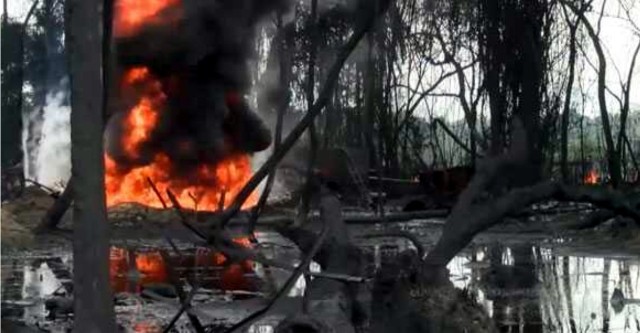Editorial
That Wike’s Bold Move Against Soot

Following the painfully obvious failure of the Federal Government and its security agencies to rein in those behind illegal oil bunkering and artisanal crude oil refiners in Rivers State, the Governor, Chief Nyesom Wike, lately declared war against operators of the crude oil refineries in the state.
The audacious action of the governor specifically aims at tackling the environmental threat induced by soot, emanating from the illegal refining of crude oil in parts of the state. Consequently, Wike directed the chairmen of councils to go after all the illegal crude oil refining sites and shut them with immediate effect. The state Chief Executive made this declaration in his 2022 New Year address to the state.
Measures were outlined and effected to tackle the soot, which have been successful so far. The Rivers State Task Force on Illegal Street Trading has been executing hit-and-run raids on some illegal crude oil refining sites in Port Harcourt and arresting several persons. Again, many identified illegal crude oil refining spots and activities in the state have either been shut down or virtually destroyed.
Governor Wike had recently declared 19 persons wanted for operating illegal crude oil refining locations, directly responsible for soots prevalent in the state. Barely 24 hours after the declaration, the Rivers State Police Command officially announced that its operatives arrested and paraded 18 persons implicated in illegal oil refining activities in various parts of the state.
Recall that a report by a technical committee set up by the state government to investigate causes of soot in the state a few years ago disclosed that the soot was engendered by subversive activities of illegal refiners and the alleged complicity of security agents, among others. A reviewed report of Prof. Roseline Konya’s findings indicated that about 22,077 persons had suffered needlessly from respiratory-related ailments in the last five years.
Medical experts have associated the persistent soot in the state with rising cases of cancer and infertility. Their assertions were corroborated by a recent study published in the Journal of Health and Pollution titled: “Exposure to Heavy Metals in Soot Samples and Cancer Risk Assessment in Port Harcourt, Nigeria.” According to the researchers, the study was carried out to determine the presence and levels of heavy metals in soot along with a cancer risk assessment of heavy metals exposure in Port Harcourt.
A specialist and consultant surgeon at the Rivers State University Teaching Hospital (RSUTH), Port Harcourt, Dr. Ibifuro Green, said about six million residents of Rivers State faced the risk of developing cancer of the lung and other respiratory problems, following the never-ending raining of cancerous hydrocarbon elements, commonly referred to as “black soot” on their environment. This startling revelation should be of genuine concern to all.
Meanwhile, the gloomy predictions by many health professionals are that if nothing is done urgently to halt the soot, many residents might experience chronic respiratory diseases, heart problems and an increase in mortality rate. This is becoming real as some persons, who have found it very difficult breathing while in Port Harcourt, have relocated to other places.
We commend the governor for listening to the cry of Rivers people by resolving to take on all crude oil thieves and refiners precipitately. While successes recorded in the war against oil thieves are acknowledged, we urge security agents to collaborate closely with council chairmen and traditional rulers to complement the governor’s efforts towards ending the public nuisance in their locations.
Rivers people cannot be their own implacable enemies. We must collectively fight this peril. The hazard we are faced with is becoming worrisome. Everyone who lives and does business in Rivers State should be solicitous about the soot and its effects. Time has come to end the impending catastrophe. It is necessary to know that the combined effect of soot and COVID-19 poses an existential threat to all residents of the state.
Those aiding and abetting illegal bunkering activities in different parts of the state who have been identified should be named, shamed and prosecuted, regardless of their political affiliations and status. Wike has shown that he is decisive and firm in prosecuting the fight, as a success in the war cannot afford favouritism. Residents must report shrewd operators of illegal crude oil refineries and other damnable activities to task forces set up at the state and local government levels for immediate action.
Furthermore, a strong institutional capacity for the judiciary is imperative. The Rivers State Assembly should exercise effective oversight, insist on the swift prosecution of offenders, and demand accountability from all recognised groups and institutions involved in the anti-soot crusade. Civil society organisations in the state should not give up but join the fray through unrelenting public engagements. There should be no cover-ups and sacred cows.
There is a need for the Federal Government to vigorously collaborate and assist the Rivers State Government in finding a lasting solution to this crisis. It is quite amazing why the federal authorities, whose security agencies have further complicated the soot situation by their collusion, have failed to take interest in ending this challenge. This is mainly the Federal Government’s business that requires a collective and inclusive solution as quickly as possible.
Editorial
Resolve Rumuwoji Market Issues, Others

Editorial
As NDG Ends Season 2

Editorial
Beginning A New Dawn At RSNC

-
Politics3 days ago
2027: NIGERIANS FAULT INEC ON DIGITAL MEMBERSHIP REGISTER DIRECTIVE
-

 Environment3 days ago
Environment3 days agoLAWMA Director Says Sweeping Reforms Have Improved Waste Collection
-
Politics3 days ago
LP Crisis: Ex-NWC Member Dumps Dumps Abure Faction
-

 Politics3 days ago
Politics3 days agoUmahi Dismisses Allegations On Social Media, Insists On Projects Delivery
-

 Sports3 days ago
Sports3 days agoAbia Not Sure To Secure continental Ticket
-
Sports3 days ago
La Liga: Yamal Records First Career Hat-trick
-

 Sports3 days ago
Sports3 days agoCity Survive Leeds’ Challenge At Elland Road
-
Politics3 days ago
NATASHA ELECTRIC VEHICLES INITIATIVE IN KOGI CENTRAL

